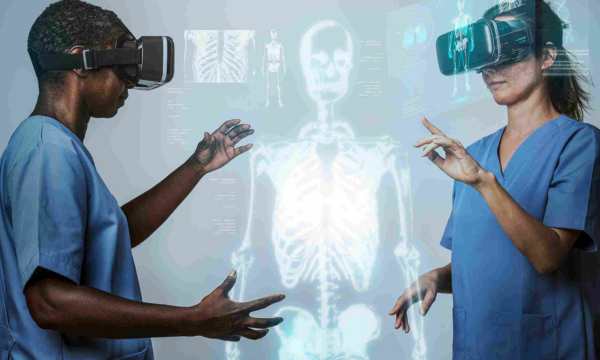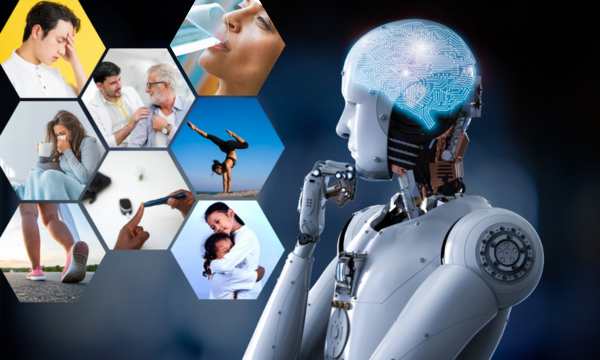Emotional health and AI are increasingly connected, opening up new possibilities in emotional care.
Ad
In recent years, technology has advanced rapidly, and AI has become a powerful ally in the field of emotional health.
With the growing demand for psychological support, the integration of AI offers innovative solutions. These tools do not replace human contact but complement the work of professionals, improving access and effectiveness of treatments.
Continue reading and find out how Artificial Intelligence can collaborate on this matter!
1. Emotional Challenges: AI as an Aid in Identifying Warning Signs
Emotional health and AI converge promisingly in the early detection of emotional issues. AI is capable of analyzing large volumes of data, identifying subtle patterns that may indicate the onset of an emotional issue.
These analyses range from online behaviors to subtle changes in speech and writing, which may go unnoticed by professionals.
AI algorithms can be trained to recognize warning signs, such as changes in mood or sleep patterns, allowing for early intervention.
This is particularly useful, as initial treatment can make a significant difference in recovery. Furthermore, AI can help reduce the stigma associated with seeking help, as it allows people to monitor their emotional health privately.
With early detection, treatment can start before symptoms worsen, improving the chances of success. Therefore, AI not only assists in the early identification of emotional issues but also offers a new layer of support, making diagnosis more accessible and accurate.
2. Digital Therapies: How Chatbots and AI Applications Can Help with Treatments
At the intersection of emotional health and AI, chatbots and AI apps emerge as valuable tools for treating emotional issues. These resources offer continuous support to patients, even outside traditional therapy sessions.
With the help of AI, chatbots can provide immediate interventions during crises, helping to stabilize the user’s emotional state. Digital therapy apps also offer personalized programs, adapting therapeutic approaches to individual needs. This is made possible through the analysis of behavioral and emotional data performed by AI.
These apps can suggest breathing exercises, meditation, or even cognitive restructuring techniques to help manage symptoms. Additionally, AI chatbots are programmed to respond empathetically, providing a constant presence for those needing immediate support.
Some practical examples of applications and online platforms that use AI:
- Wysa: Therapy chatbot
- Woebot: Emotional Health Support (Chat)
- Replika: Chatbot powered by artificial intelligence
3. Mindfulness and Relaxation Techniques with the Help of Technology
Emotional health and AI go hand in hand in managing stress and well-being, offering new approaches for emotional balance. AI tools are used to guide mindfulness practices, helping users focus on the present and reduce stress.
AI-based apps can monitor stress signals, such as heart rate and sleep patterns, adjusting relaxation techniques as needed. These technologies not only guide users through breathing exercises and meditation but also adapt sessions based on real-time feedback.
Personalization of these practices enhances the effectiveness of mindfulness techniques, making them more suited to individual needs. Additionally, AI can recommend specific activities to alleviate stress, such as walks or strategic breaks throughout the day.
The use of AI in stress and well-being management is a clear demonstration of how technology can be a powerful ally in caring for emotional health. With artificial intelligence, mindfulness practices and other relaxation techniques become more accessible and effective, improving users’ quality of life.

Emotional Health and AI: Relaxation techniques (Source Google)
4.The Importance of Privacy and Ethics in Using AI for Emotional Health
At the intersection of emotional health and AI, privacy and ethics emerge as crucial issues. The use of AI in the field of emotional health involves collecting and analyzing sensitive data, which must be protected with the utmost rigor.
Users’ trust depends on how this information is handled, requiring transparency and accountability from the companies and professionals involved. It is essential that AI tools are developed with a focus on privacy, ensuring that user data is stored securely and anonymized whenever possible.
Transparency about how data is used and who has access to it is crucial to maintaining users’ trust.
Additionally, ethical implications of using AI in emotional health must be addressed. The automation of certain processes, such as diagnosis and therapy, should be balanced with human presence to avoid patients feeling abandoned or disconnected. AI should complement, not replace, human contact.
Emotional health and AI must work together ethically, ensuring that technological advancements bring benefits without compromising privacy and dignity.
5.The Future of Psychotherapy: The Collaboration Between Humans and Machines
Emotional health and AI will continue to evolve together, shaping the future of psychotherapy. The collaboration between humans and machines promises a new era of treatment, where technology complements human skills.AI can provide real-time data and insights, assisting therapists in personalizing therapeutic approaches.
In the future, therapy sessions may be supported by AI assistants that help monitor patient progress and offer suggestions based on large volumes of data.
These assistants can analyze behavior patterns over time, providing valuable information that helps therapists adjust treatment strategies.
However, human interaction will remain the central element of psychotherapy. AI provides support but does not replace the empathy and understanding that therapists offer. The balance between technology and human presence will be essential for successful treatment.
Thus, the future of psychotherapy with AI integration promises to be a collaborative journey, where humans and machines work together to achieve the best outcome for the patient. Emotional health and AI, in partnership, open up new possibilities for emotional care.
6.Demystifying AI in Emotional Health: Myths and Truths
One of the main myths is that AI will completely replace emotional health professionals. In reality, AI is a tool that complements therapists’ work, providing additional support without eliminating the need for human intervention.
Another common myth is that AI cannot understand emotional nuances. Although AI still has limitations, advances in sentiment analysis show that these tools are increasingly capable of recognizing and interpreting emotions. This allows AI to offer more empathetic and contextually adjusted responses.
On the other hand, it is true that AI can improve access to treatment, especially in areas with a shortage of professionals. Chatbots and digital therapy apps provide initial and continuous support, helping to fill gaps in care.
Conclusion
Therefore, it is important to understand that AI in emotional health is not a magical solution but a powerful ally. Emotional health and AI, when used appropriately, offer new opportunities for emotional care and well-being, demystifying fears and highlighting the real benefits of this technology.


